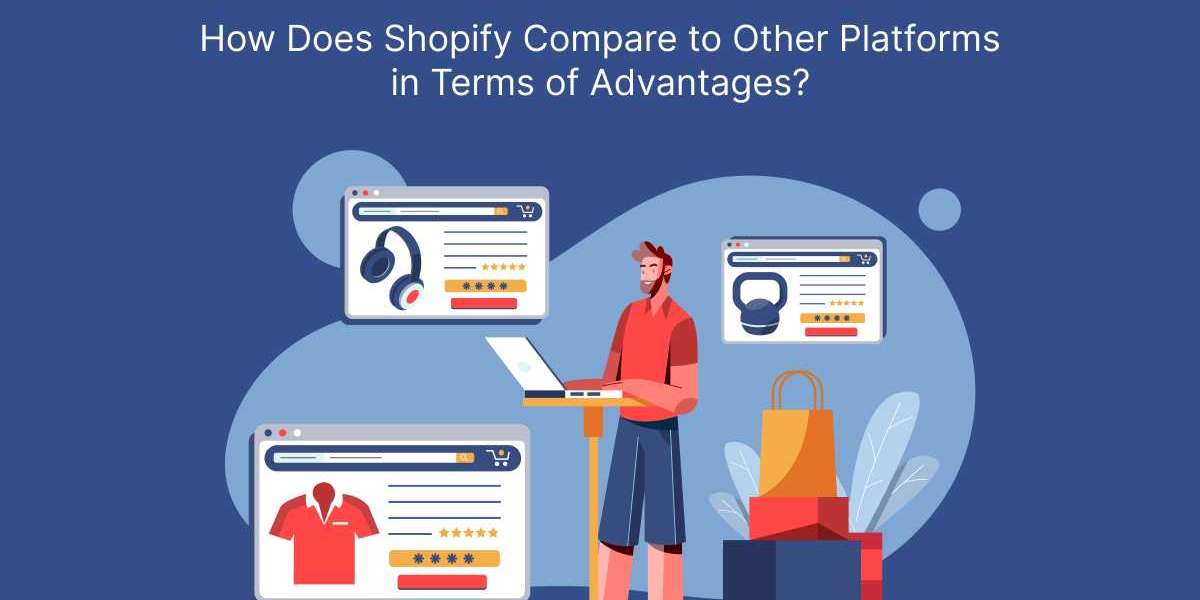When launching an e-commerce store, choosing the right platform is one of the most crucial decisions for the long-term success of your business. Shopify store app is widely regarded as one of the top e-commerce platforms available, but how does it stack up against other popular platforms like WooCommerce, BigCommerce, Wix, and Magento? Each platform has its own unique features and advantages, but Shopify has carved out a reputation for its ease of use, scalability, and comprehensive features. This article will compare Shopify with its competitors and highlight the key advantages that make it stand out.
1. Ease of Use
Shopify:
Shopify’s biggest draw is its simplicity and ease of use, making it ideal for beginners as well as experienced entrepreneurs. Shopify provides an intuitive, drag-and-drop interface that requires no coding knowledge, allowing users to create and manage their stores with minimal effort. The setup process is streamlined, with step-by-step guidance for everything from choosing a theme to setting up payment methods.
WooCommerce:
WooCommerce, a popular plugin for WordPress, offers a lot of flexibility but requires more technical knowledge compared to Shopify. Since WooCommerce operates within the WordPress ecosystem, users need to manage both their WordPress site and the WooCommerce plugin, which can be daunting for beginners. Customization requires some coding experience, and the platform is not as user-friendly for non-technical users.
BigCommerce:
BigCommerce is similar to Shopify in terms of ease of use, offering a simple interface and easy setup process. However, its dashboard is slightly more complex, with more advanced features that might overwhelm new users. While it provides good out-of-the-box functionality, Shopify’s user interface is generally considered more intuitive for first-time users.
Wix:
Wix is known for its beginner-friendly website builder, but its e-commerce functionality is not as robust as Shopify. While Wix provides an easy drag-and-drop editor, it lacks the comprehensive tools and scalability that Shopify offers for growing e-commerce businesses.
Magento:
Magento is a powerful platform, but it is significantly more complex than Shopify. Magento is open-source, offering extensive customization options for large, enterprise-level businesses. However, it requires advanced coding knowledge, and hosting must be set up separately. Shopify is far easier for small to mid-sized businesses looking for a hassle-free experience.
2. Customization and Themes
Shopify:
Shopify offers a variety of professionally designed themes that are mobile-responsive and fully customizable. Users can choose from free and paid themes, all of which can be customized using Shopify’s drag-and-drop editor or by modifying the code through Shopify’s Liquid language. This flexibility allows businesses to create a unique and visually appealing online store without needing to hire a web designer.
WooCommerce:
WooCommerce provides extensive customization options, as it is built on WordPress, one of the most flexible website builders. You can choose from thousands of themes and plugins to customize your store. However, the level of customization WooCommerce offers often requires more technical expertise than Shopify.
BigCommerce:
BigCommerce also offers customizable themes, but it has fewer options compared to Shopify. Customizing themes can be more challenging, especially for users without technical skills. Shopify’s interface makes theme customization more accessible for non-technical users.
Wix:
Wix offers a large selection of templates, and its drag-and-drop editor is one of the easiest to use. However, when it comes to building a professional e-commerce store with advanced features, Wix doesn’t offer the same level of functionality as Shopify. Its customization is more suitable for simpler websites rather than high-growth e-commerce businesses.
Magento:
Magento provides the most extensive customization options, but it is not as user-friendly. While you can build highly unique and complex stores, this requires significant coding knowledge. Shopify offers a good balance between ease of customization and flexibility, making it easier for smaller businesses to build a professional store.
3. Features and Apps
Shopify:
One of Shopify’s standout advantages is its extensive App Store, offering over 8,000 apps that allow users to add various features and functionalities to their stores. Whether it’s marketing, inventory management, SEO, or customer support, Shopify apps make it easy to scale and customize your store. Shopify also provides built-in SEO tools, social media integration, and analytics, making it a comprehensive solution.
WooCommerce:
WooCommerce is highly flexible, but its functionality often depends on the plugins you choose. While WooCommerce has a vast ecosystem of plugins, managing them can become cumbersome. Users need to keep their plugins updated and compatible, which can be time-consuming and lead to technical issues. Shopify’s app ecosystem is more streamlined and easier to manage.
BigCommerce:
BigCommerce provides many built-in features, reducing the need for third-party apps. While this is convenient, it can make the platform less flexible than Shopify, which allows users to pick and choose from a broader range of apps. Shopify’s extensive App Store gives users more options to customize their store’s functionality.
Wix:
Wix has an app marketplace, but it is more limited in terms of e-commerce-specific functionality compared to Shopify. While suitable for small businesses, it lacks the advanced features and scalability needed for larger online stores.
Magento:
Magento offers a wide range of features and third-party extensions, but managing these requires technical expertise. It is highly customizable but less convenient for small businesses that prefer a more straightforward solution. Shopify’s out-of-the-box features and app integrations are easier to set up and manage.
4. Scalability
Shopify:
Shopify is built to scale. Whether you’re just starting out or running a large enterprise, Shopify can handle increased traffic, sales, and product catalog expansion with ease. Shopify Plus, the enterprise-level version, offers advanced features for high-growth businesses, making Shopify a long-term solution for businesses looking to scale.
WooCommerce:
WooCommerce is scalable but requires more effort from the user. You need to ensure that your hosting and plugins are optimized to handle increased traffic and sales. As your store grows, you may need to invest in more powerful hosting solutions, which can become costly.
BigCommerce:
BigCommerce is also scalable, but some users report that advanced features can be difficult to use without technical knowledge. Shopify’s combination of ease of use and scalability makes it more accessible for growing businesses.
Wix:
Wix is not as scalable as Shopify. While it is great for small businesses, it lacks the advanced tools and infrastructure to handle larger e-commerce operations.
Magento:
Magento is highly scalable but requires significant technical resources and development time to manage. It is better suited for large enterprises with dedicated IT teams. Shopify offers a more user-friendly scaling solution for businesses that don’t want to manage complex back-end systems.
Conclusion
When comparing advantage Shopify to other e-commerce platforms, its unique advantages in ease of use, customization, app ecosystem, and scalability make it a top choice for businesses of all sizes. While platforms like WooCommerce, BigCommerce, and Magento offer their own strengths, Shopify’s balance of simplicity, flexibility, and robust features makes it particularly attractive for entrepreneurs and growing businesses looking for a reliable, scalable e-commerce solution.







